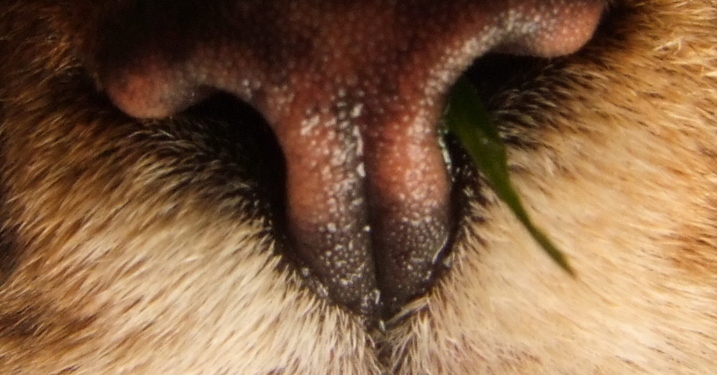Max was a smart, inquisitive and friendly cat. He was the only animal in the house, and he enjoyed his role as the centre of human attention. He was sleeping in the armchair in the living room, when he suddenly sat up, looking disturbed. He gulped a few times, made a coughing sound, then started to sneeze.
It’s common for cats to sneeze from time to time (like humans), but this sneezing was not a mild one-off. Max was sneezing loudly and violently, and he kept on doing it. He sneezed a dozen times, then stopped, then started to sneeze some more. Stephen went over to look at him, but there was nothing visibly wrong with his nose. Max sneezed a few more times, and then began to paw at his nose, as if there was something uncomfortable going on.
Stephen knew that cats can suffer from cat flu, and that this can often make them sneeze. But he had an idea that cat flu caused other signs of illness too, like runny eyes and a discharge from the nose. Max had none of these things. He looked as healthy as ever, but simply, he had started to sneeze. Stephen and his wife had been having dinner when the sneezing started. Could the pepper that they had sprinkled onto their soup somehow have been inhaled by Max? He was some distance away from the dinner table so this hardly seemed likely. Max was now quite distressed, and the episodes of repeated sneezing showed no signs of settling down. Stephen made a quick decision to take Max to the vet.
Stephen could hear him sneezing for most of the ten minute journey to our vet clinic. He took a seat in our waiting room, with Max at his feet, and as he waited, the sneezing was getting even more loud and forceful. He bent down to talk to Max, to reassure him, and it was then that he noticed something strange. A green object was protruding from Max’s left nostril.
At that moment, I called them into my consulting room. As I listened to the story, I opened Max’s cage and lifted him onto the table. There are not many causes of sudden onset sneezing in cats, and as soon as I saw Max, my suspicion was confirmed: the green object that Stephen had noticed was the tip of a blade of grass. When I questioned Stephen, he confirmed that he had noticed Max chewing grass in the garden on several occasions.
Grass-eating is common in both dogs and cats, and it’s generally completely harmless: it may even have some health benefits for pets. But the one complication that can sometimes happen is when a cat regurgitates grass. There is no problem if the grass is brought up as part of a dollup of food and other stomach contents. Cat vomit is not pleasant to clean up, and if your cat ever does this, you may find that it sometimes contains pieces of grass. But if the grass goes “the wrong way”, it can end up passing into the nasal chamber, rather than fully exiting the body via the mouth.
The inside of the nose is like a maze, with narrow tubes twisting and turning. Once a blade of grass enters the back of the nose, it is very difficult to get it out. It won’t go back the way that it has come – all the body’s reflexes act against the inhalation of a solid object. Instead, the irritation caused by the grass stimulates the body to try to get rid of it in the opposite direction – hence the violent sneezing. Unfortunately, a wet blade of grass is sticky, and it does not easily move once wedged inside the narrow confines of the inside of the nose.
Max had made the diagnosis of his problem easy for me, but now I had to remove the grass fully, without leaving any behind. Leaves of grass can easily break, and it could get very complicated if a small fragment was left in the middle of his nasal chamber. I have heard of cats needing to be anaesthetised while fluid is repeatedly flushed through the nose when this has happened. I was also aware that the nose has an exquisitely sensitive lining. If that piece of grass was tugged, it could cause Max pain and distress.
I asked a nurse to hold Max firmly, and I took a pair of secure, narrow-tipped forceps. I used these to grasp the piece of grass as far up as I could, then I gave a single, smooth, strong pull. I was ready for Max to react, and he did wriggle, but it was all over in a moment. The entire piece of grass dangled from my forceps tip. It was no wonder that Max had felt uncomfortable when this was lodged inside his nose.
The grass had damaged Max’s nose a little, and there were a few drops of blood. But the sneezing stopped at once, and it didn’t start again.
TIPS
- Many dogs and cats graze on grass from time to time.
- When a cat regurgitates grass, pieces can lodge in the nose.
- If a cat starts sudden, repeated sneezing, this is a common cause.

